Research Project: Social Media Marketing Impact on Retail Sales
VerifiedAdded on 2020/12/09
|21
|4531
|233
Project
AI Summary
This research project investigates the influence of social media marketing on the sales of retail sector organizations, using Lidl supermarket as a case study. The project begins with an introduction to the topic, outlining the research aim, objectives, and questions. It then explores factors contributing to project selection, reviews key references on social media marketing concepts, its significance for business operations, and its impact on retail sales. The methodology section details the research philosophy (interpretivism), design (descriptive), approach (deductive), strategy (qualitative and quantitative), data collection methods (primary through questionnaires and secondary through literature), sampling (managers of Lidl), and data analysis (thematic). The project includes a timescale, research specification, and proposed researcher investigation, detailing data collection and analysis. The findings will be presented, evaluated, and recommendations for further analysis will be provided.

Research Project
Paraphrase This Document
Need a fresh take? Get an instant paraphrase of this document with our AI Paraphraser
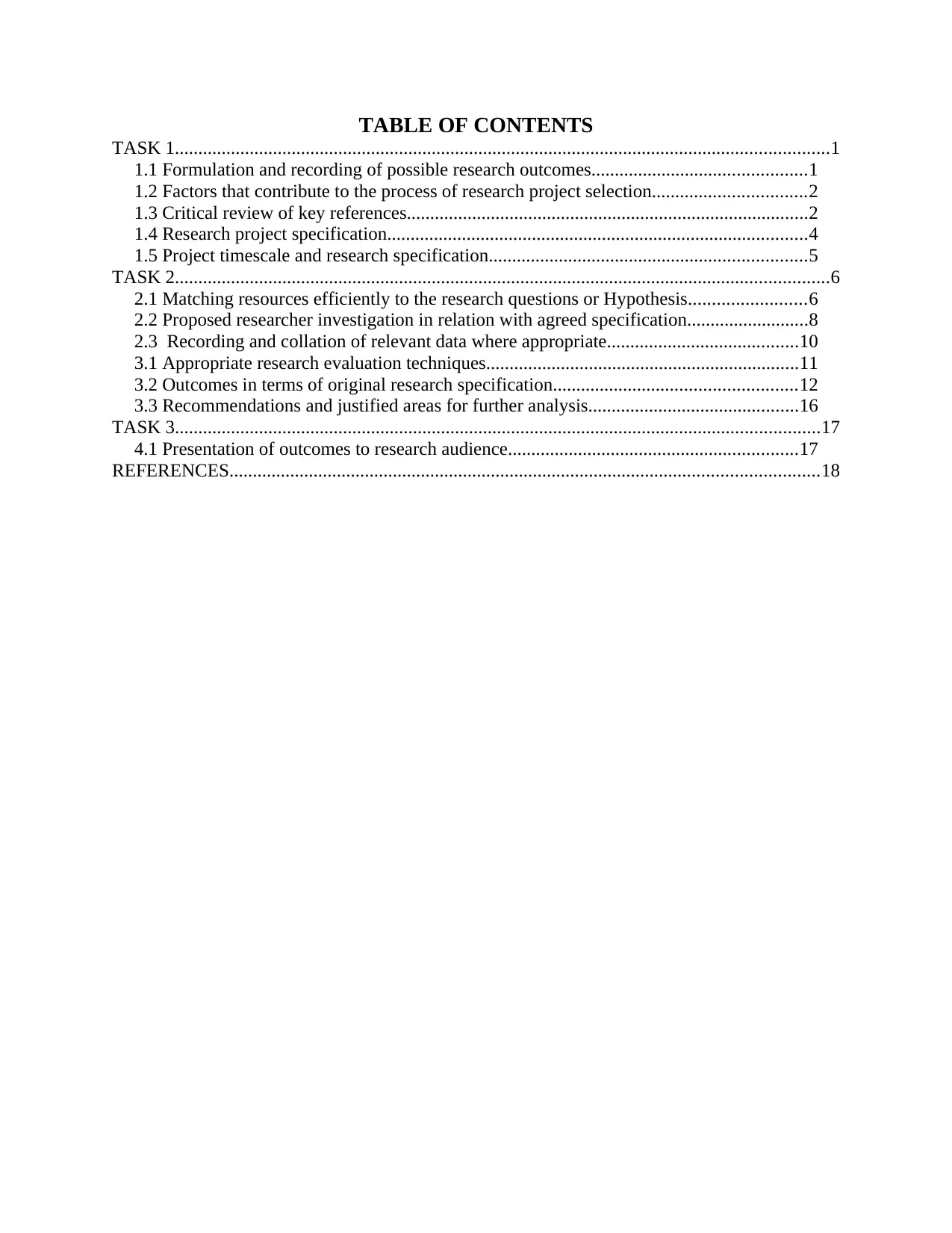
TABLE OF CONTENTS
TASK 1............................................................................................................................................1
1.1 Formulation and recording of possible research outcomes..............................................1
1.2 Factors that contribute to the process of research project selection.................................2
1.3 Critical review of key references......................................................................................2
1.4 Research project specification..........................................................................................4
1.5 Project timescale and research specification....................................................................5
TASK 2............................................................................................................................................6
2.1 Matching resources efficiently to the research questions or Hypothesis.........................6
2.2 Proposed researcher investigation in relation with agreed specification..........................8
2.3 Recording and collation of relevant data where appropriate.........................................10
3.1 Appropriate research evaluation techniques...................................................................11
3.2 Outcomes in terms of original research specification....................................................12
3.3 Recommendations and justified areas for further analysis.............................................16
TASK 3..........................................................................................................................................17
4.1 Presentation of outcomes to research audience..............................................................17
REFERENCES..............................................................................................................................18
TASK 1............................................................................................................................................1
1.1 Formulation and recording of possible research outcomes..............................................1
1.2 Factors that contribute to the process of research project selection.................................2
1.3 Critical review of key references......................................................................................2
1.4 Research project specification..........................................................................................4
1.5 Project timescale and research specification....................................................................5
TASK 2............................................................................................................................................6
2.1 Matching resources efficiently to the research questions or Hypothesis.........................6
2.2 Proposed researcher investigation in relation with agreed specification..........................8
2.3 Recording and collation of relevant data where appropriate.........................................10
3.1 Appropriate research evaluation techniques...................................................................11
3.2 Outcomes in terms of original research specification....................................................12
3.3 Recommendations and justified areas for further analysis.............................................16
TASK 3..........................................................................................................................................17
4.1 Presentation of outcomes to research audience..............................................................17
REFERENCES..............................................................................................................................18
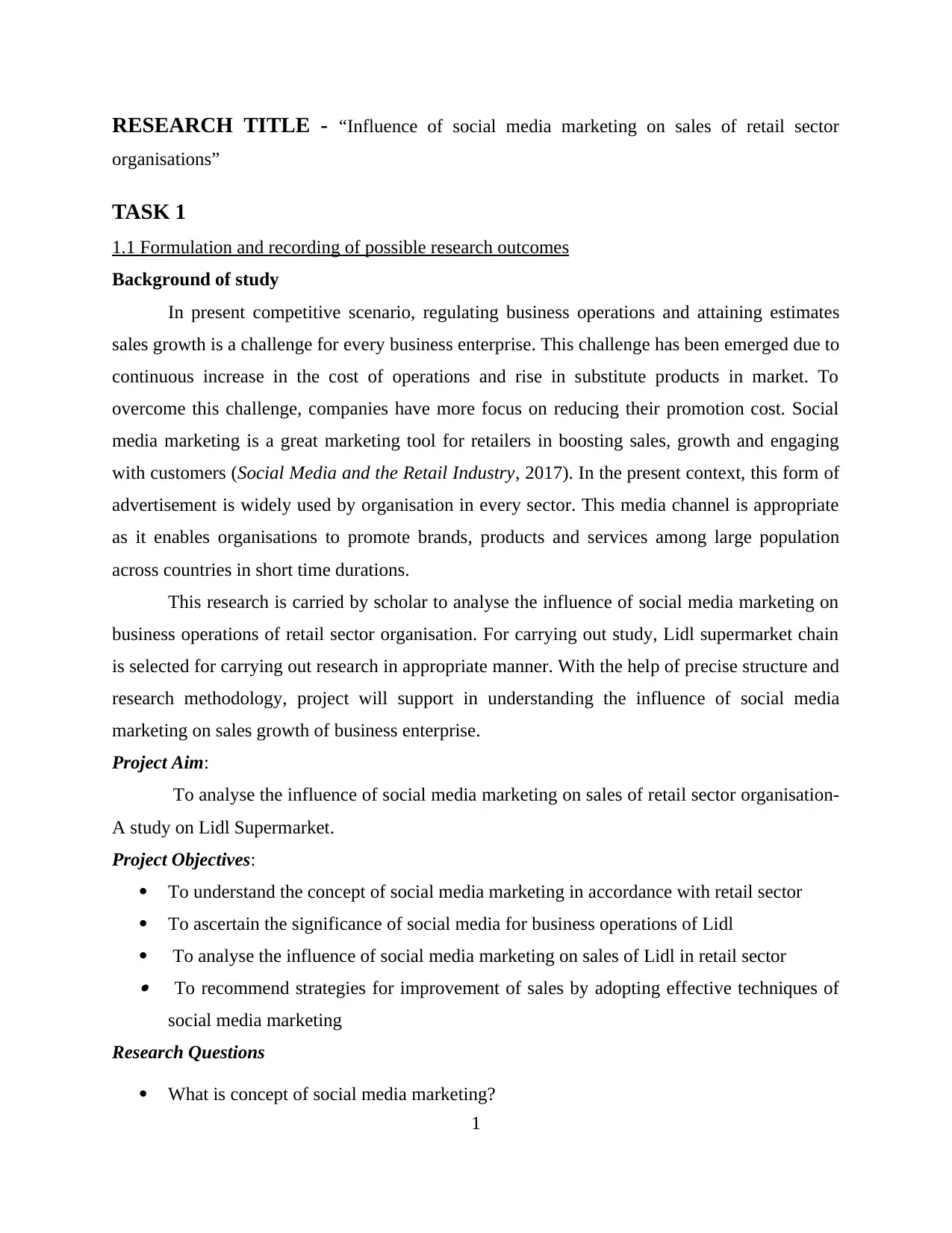
RESEARCH TITLE - “Influence of social media marketing on sales of retail sector
organisations”
TASK 1
1.1 Formulation and recording of possible research outcomes
Background of study
In present competitive scenario, regulating business operations and attaining estimates
sales growth is a challenge for every business enterprise. This challenge has been emerged due to
continuous increase in the cost of operations and rise in substitute products in market. To
overcome this challenge, companies have more focus on reducing their promotion cost. Social
media marketing is a great marketing tool for retailers in boosting sales, growth and engaging
with customers (Social Media and the Retail Industry, 2017). In the present context, this form of
advertisement is widely used by organisation in every sector. This media channel is appropriate
as it enables organisations to promote brands, products and services among large population
across countries in short time durations.
This research is carried by scholar to analyse the influence of social media marketing on
business operations of retail sector organisation. For carrying out study, Lidl supermarket chain
is selected for carrying out research in appropriate manner. With the help of precise structure and
research methodology, project will support in understanding the influence of social media
marketing on sales growth of business enterprise.
Project Aim:
To analyse the influence of social media marketing on sales of retail sector organisation-
A study on Lidl Supermarket.
Project Objectives:
To understand the concept of social media marketing in accordance with retail sector
To ascertain the significance of social media for business operations of Lidl
To analyse the influence of social media marketing on sales of Lidl in retail sector To recommend strategies for improvement of sales by adopting effective techniques of
social media marketing
Research Questions
What is concept of social media marketing?
1
organisations”
TASK 1
1.1 Formulation and recording of possible research outcomes
Background of study
In present competitive scenario, regulating business operations and attaining estimates
sales growth is a challenge for every business enterprise. This challenge has been emerged due to
continuous increase in the cost of operations and rise in substitute products in market. To
overcome this challenge, companies have more focus on reducing their promotion cost. Social
media marketing is a great marketing tool for retailers in boosting sales, growth and engaging
with customers (Social Media and the Retail Industry, 2017). In the present context, this form of
advertisement is widely used by organisation in every sector. This media channel is appropriate
as it enables organisations to promote brands, products and services among large population
across countries in short time durations.
This research is carried by scholar to analyse the influence of social media marketing on
business operations of retail sector organisation. For carrying out study, Lidl supermarket chain
is selected for carrying out research in appropriate manner. With the help of precise structure and
research methodology, project will support in understanding the influence of social media
marketing on sales growth of business enterprise.
Project Aim:
To analyse the influence of social media marketing on sales of retail sector organisation-
A study on Lidl Supermarket.
Project Objectives:
To understand the concept of social media marketing in accordance with retail sector
To ascertain the significance of social media for business operations of Lidl
To analyse the influence of social media marketing on sales of Lidl in retail sector To recommend strategies for improvement of sales by adopting effective techniques of
social media marketing
Research Questions
What is concept of social media marketing?
1
⊘ This is a preview!⊘
Do you want full access?
Subscribe today to unlock all pages.

Trusted by 1+ million students worldwide
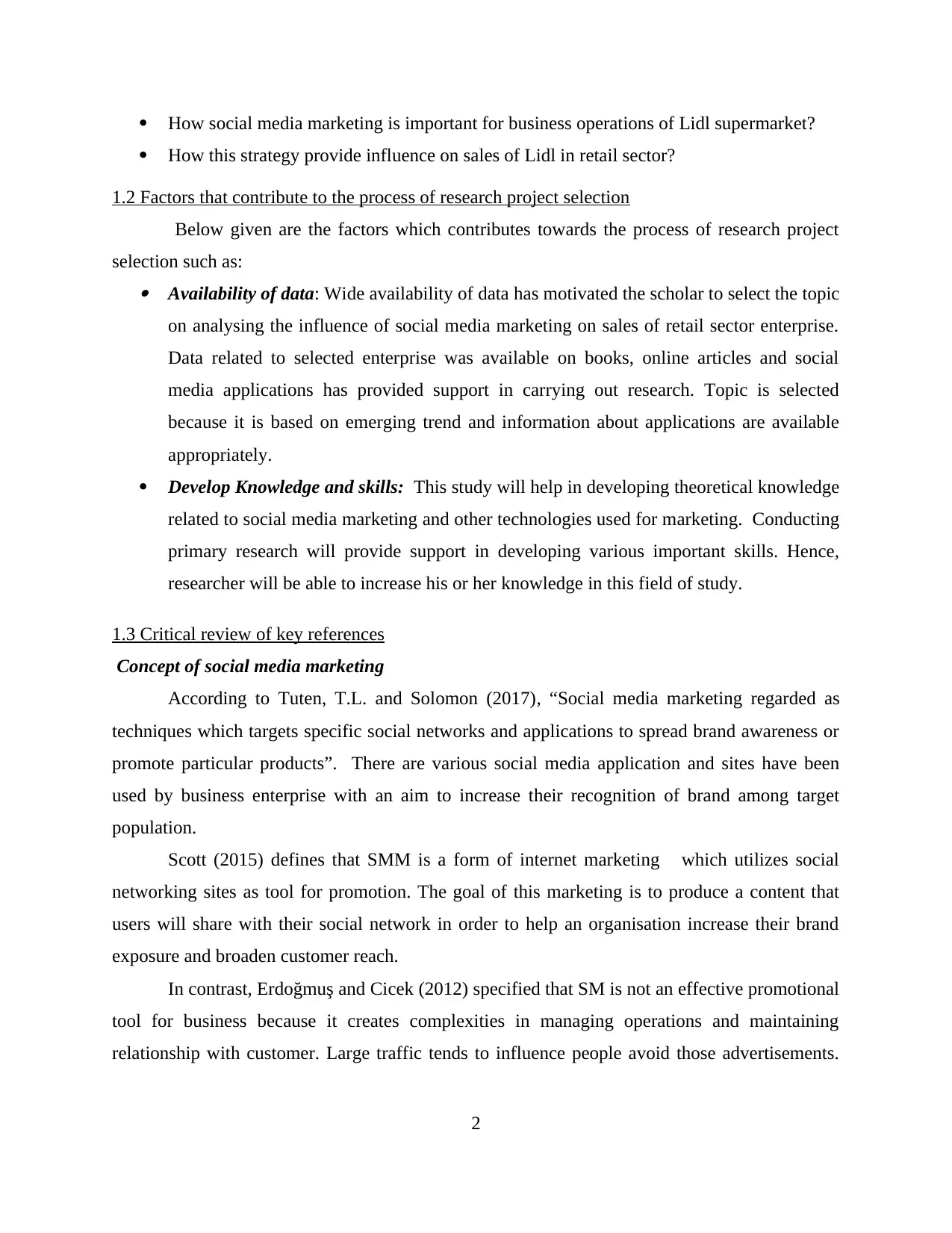
How social media marketing is important for business operations of Lidl supermarket?
How this strategy provide influence on sales of Lidl in retail sector?
1.2 Factors that contribute to the process of research project selection
Below given are the factors which contributes towards the process of research project
selection such as: Availability of data: Wide availability of data has motivated the scholar to select the topic
on analysing the influence of social media marketing on sales of retail sector enterprise.
Data related to selected enterprise was available on books, online articles and social
media applications has provided support in carrying out research. Topic is selected
because it is based on emerging trend and information about applications are available
appropriately.
Develop Knowledge and skills: This study will help in developing theoretical knowledge
related to social media marketing and other technologies used for marketing. Conducting
primary research will provide support in developing various important skills. Hence,
researcher will be able to increase his or her knowledge in this field of study.
1.3 Critical review of key references
Concept of social media marketing
According to Tuten, T.L. and Solomon (2017), “Social media marketing regarded as
techniques which targets specific social networks and applications to spread brand awareness or
promote particular products”. There are various social media application and sites have been
used by business enterprise with an aim to increase their recognition of brand among target
population.
Scott (2015) defines that SMM is a form of internet marketing which utilizes social
networking sites as tool for promotion. The goal of this marketing is to produce a content that
users will share with their social network in order to help an organisation increase their brand
exposure and broaden customer reach.
In contrast, Erdoğmuş and Cicek (2012) specified that SM is not an effective promotional
tool for business because it creates complexities in managing operations and maintaining
relationship with customer. Large traffic tends to influence people avoid those advertisements.
2
How this strategy provide influence on sales of Lidl in retail sector?
1.2 Factors that contribute to the process of research project selection
Below given are the factors which contributes towards the process of research project
selection such as: Availability of data: Wide availability of data has motivated the scholar to select the topic
on analysing the influence of social media marketing on sales of retail sector enterprise.
Data related to selected enterprise was available on books, online articles and social
media applications has provided support in carrying out research. Topic is selected
because it is based on emerging trend and information about applications are available
appropriately.
Develop Knowledge and skills: This study will help in developing theoretical knowledge
related to social media marketing and other technologies used for marketing. Conducting
primary research will provide support in developing various important skills. Hence,
researcher will be able to increase his or her knowledge in this field of study.
1.3 Critical review of key references
Concept of social media marketing
According to Tuten, T.L. and Solomon (2017), “Social media marketing regarded as
techniques which targets specific social networks and applications to spread brand awareness or
promote particular products”. There are various social media application and sites have been
used by business enterprise with an aim to increase their recognition of brand among target
population.
Scott (2015) defines that SMM is a form of internet marketing which utilizes social
networking sites as tool for promotion. The goal of this marketing is to produce a content that
users will share with their social network in order to help an organisation increase their brand
exposure and broaden customer reach.
In contrast, Erdoğmuş and Cicek (2012) specified that SM is not an effective promotional
tool for business because it creates complexities in managing operations and maintaining
relationship with customer. Large traffic tends to influence people avoid those advertisements.
2
Paraphrase This Document
Need a fresh take? Get an instant paraphrase of this document with our AI Paraphraser
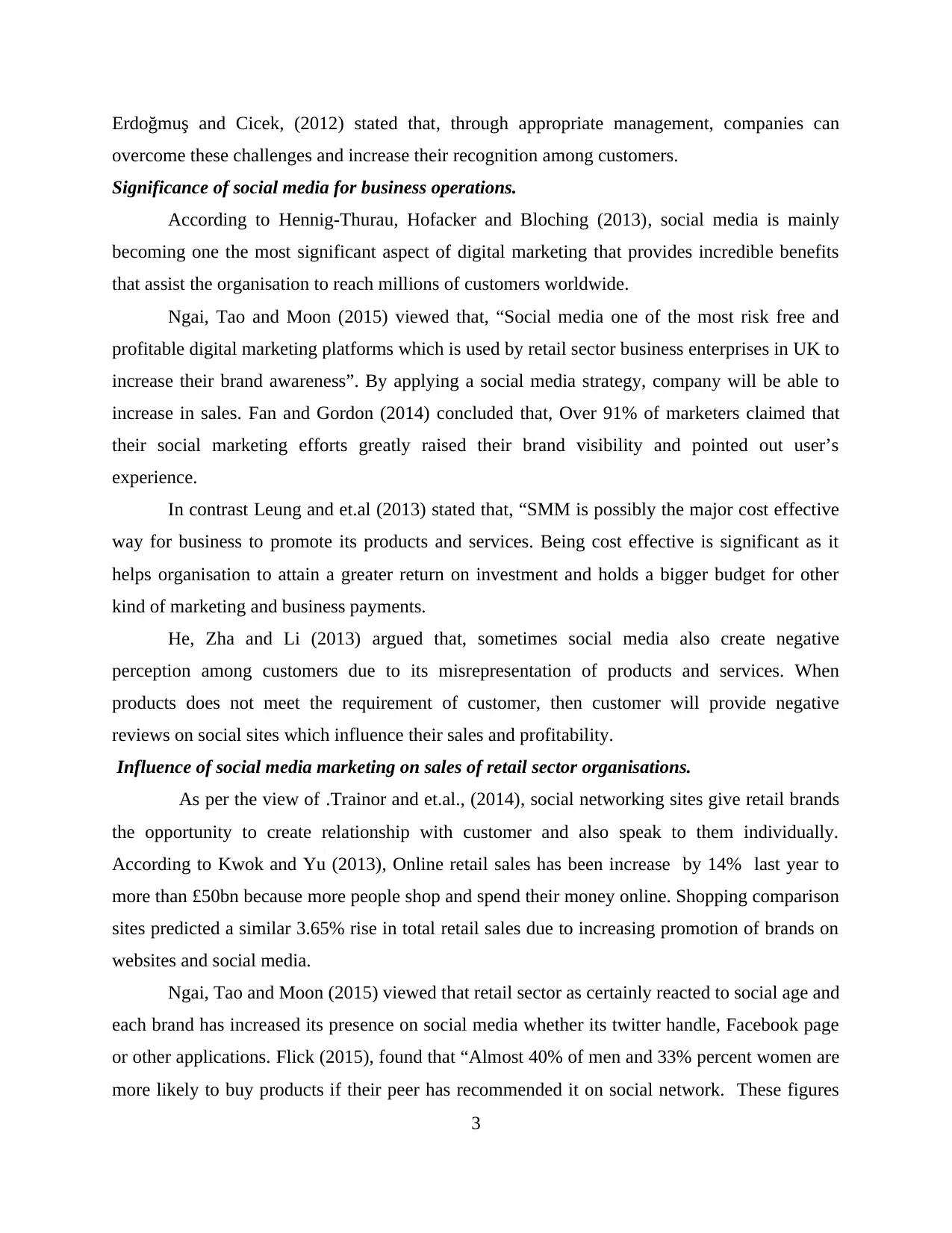
Erdoğmuş and Cicek, (2012) stated that, through appropriate management, companies can
overcome these challenges and increase their recognition among customers.
Significance of social media for business operations.
According to Hennig-Thurau, Hofacker and Bloching (2013), social media is mainly
becoming one the most significant aspect of digital marketing that provides incredible benefits
that assist the organisation to reach millions of customers worldwide.
Ngai, Tao and Moon (2015) viewed that, “Social media one of the most risk free and
profitable digital marketing platforms which is used by retail sector business enterprises in UK to
increase their brand awareness”. By applying a social media strategy, company will be able to
increase in sales. Fan and Gordon (2014) concluded that, Over 91% of marketers claimed that
their social marketing efforts greatly raised their brand visibility and pointed out user’s
experience.
In contrast Leung and et.al (2013) stated that, “SMM is possibly the major cost effective
way for business to promote its products and services. Being cost effective is significant as it
helps organisation to attain a greater return on investment and holds a bigger budget for other
kind of marketing and business payments.
He, Zha and Li (2013) argued that, sometimes social media also create negative
perception among customers due to its misrepresentation of products and services. When
products does not meet the requirement of customer, then customer will provide negative
reviews on social sites which influence their sales and profitability.
Influence of social media marketing on sales of retail sector organisations.
As per the view of .Trainor and et.al., (2014), social networking sites give retail brands
the opportunity to create relationship with customer and also speak to them individually.
According to Kwok and Yu (2013), Online retail sales has been increase by 14% last year to
more than £50bn because more people shop and spend their money online. Shopping comparison
sites predicted a similar 3.65% rise in total retail sales due to increasing promotion of brands on
websites and social media.
Ngai, Tao and Moon (2015) viewed that retail sector as certainly reacted to social age and
each brand has increased its presence on social media whether its twitter handle, Facebook page
or other applications. Flick (2015), found that “Almost 40% of men and 33% percent women are
more likely to buy products if their peer has recommended it on social network. These figures
3
overcome these challenges and increase their recognition among customers.
Significance of social media for business operations.
According to Hennig-Thurau, Hofacker and Bloching (2013), social media is mainly
becoming one the most significant aspect of digital marketing that provides incredible benefits
that assist the organisation to reach millions of customers worldwide.
Ngai, Tao and Moon (2015) viewed that, “Social media one of the most risk free and
profitable digital marketing platforms which is used by retail sector business enterprises in UK to
increase their brand awareness”. By applying a social media strategy, company will be able to
increase in sales. Fan and Gordon (2014) concluded that, Over 91% of marketers claimed that
their social marketing efforts greatly raised their brand visibility and pointed out user’s
experience.
In contrast Leung and et.al (2013) stated that, “SMM is possibly the major cost effective
way for business to promote its products and services. Being cost effective is significant as it
helps organisation to attain a greater return on investment and holds a bigger budget for other
kind of marketing and business payments.
He, Zha and Li (2013) argued that, sometimes social media also create negative
perception among customers due to its misrepresentation of products and services. When
products does not meet the requirement of customer, then customer will provide negative
reviews on social sites which influence their sales and profitability.
Influence of social media marketing on sales of retail sector organisations.
As per the view of .Trainor and et.al., (2014), social networking sites give retail brands
the opportunity to create relationship with customer and also speak to them individually.
According to Kwok and Yu (2013), Online retail sales has been increase by 14% last year to
more than £50bn because more people shop and spend their money online. Shopping comparison
sites predicted a similar 3.65% rise in total retail sales due to increasing promotion of brands on
websites and social media.
Ngai, Tao and Moon (2015) viewed that retail sector as certainly reacted to social age and
each brand has increased its presence on social media whether its twitter handle, Facebook page
or other applications. Flick (2015), found that “Almost 40% of men and 33% percent women are
more likely to buy products if their peer has recommended it on social network. These figures
3
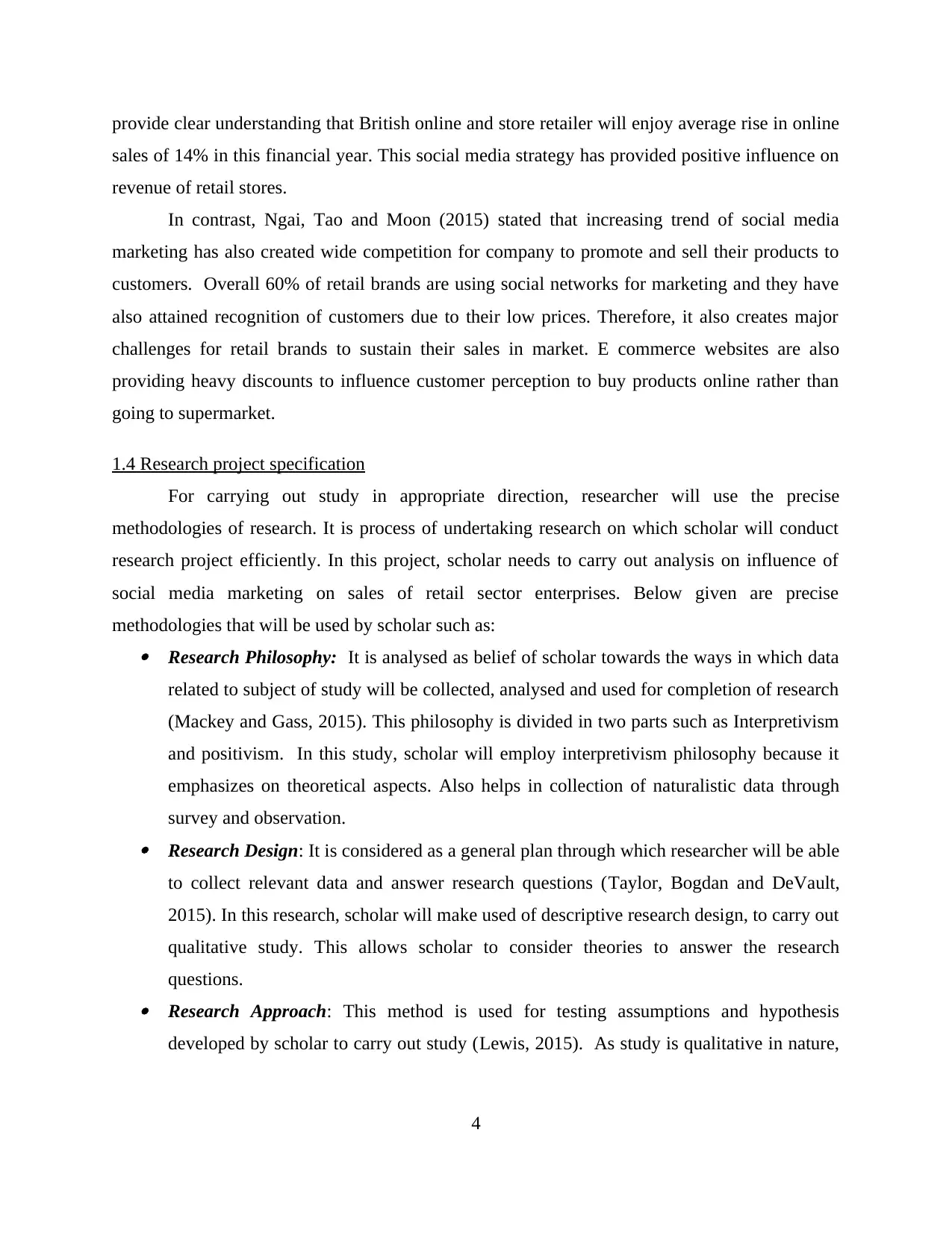
provide clear understanding that British online and store retailer will enjoy average rise in online
sales of 14% in this financial year. This social media strategy has provided positive influence on
revenue of retail stores.
In contrast, Ngai, Tao and Moon (2015) stated that increasing trend of social media
marketing has also created wide competition for company to promote and sell their products to
customers. Overall 60% of retail brands are using social networks for marketing and they have
also attained recognition of customers due to their low prices. Therefore, it also creates major
challenges for retail brands to sustain their sales in market. E commerce websites are also
providing heavy discounts to influence customer perception to buy products online rather than
going to supermarket.
1.4 Research project specification
For carrying out study in appropriate direction, researcher will use the precise
methodologies of research. It is process of undertaking research on which scholar will conduct
research project efficiently. In this project, scholar needs to carry out analysis on influence of
social media marketing on sales of retail sector enterprises. Below given are precise
methodologies that will be used by scholar such as: Research Philosophy: It is analysed as belief of scholar towards the ways in which data
related to subject of study will be collected, analysed and used for completion of research
(Mackey and Gass, 2015). This philosophy is divided in two parts such as Interpretivism
and positivism. In this study, scholar will employ interpretivism philosophy because it
emphasizes on theoretical aspects. Also helps in collection of naturalistic data through
survey and observation. Research Design: It is considered as a general plan through which researcher will be able
to collect relevant data and answer research questions (Taylor, Bogdan and DeVault,
2015). In this research, scholar will make used of descriptive research design, to carry out
qualitative study. This allows scholar to consider theories to answer the research
questions. Research Approach: This method is used for testing assumptions and hypothesis
developed by scholar to carry out study (Lewis, 2015). As study is qualitative in nature,
4
sales of 14% in this financial year. This social media strategy has provided positive influence on
revenue of retail stores.
In contrast, Ngai, Tao and Moon (2015) stated that increasing trend of social media
marketing has also created wide competition for company to promote and sell their products to
customers. Overall 60% of retail brands are using social networks for marketing and they have
also attained recognition of customers due to their low prices. Therefore, it also creates major
challenges for retail brands to sustain their sales in market. E commerce websites are also
providing heavy discounts to influence customer perception to buy products online rather than
going to supermarket.
1.4 Research project specification
For carrying out study in appropriate direction, researcher will use the precise
methodologies of research. It is process of undertaking research on which scholar will conduct
research project efficiently. In this project, scholar needs to carry out analysis on influence of
social media marketing on sales of retail sector enterprises. Below given are precise
methodologies that will be used by scholar such as: Research Philosophy: It is analysed as belief of scholar towards the ways in which data
related to subject of study will be collected, analysed and used for completion of research
(Mackey and Gass, 2015). This philosophy is divided in two parts such as Interpretivism
and positivism. In this study, scholar will employ interpretivism philosophy because it
emphasizes on theoretical aspects. Also helps in collection of naturalistic data through
survey and observation. Research Design: It is considered as a general plan through which researcher will be able
to collect relevant data and answer research questions (Taylor, Bogdan and DeVault,
2015). In this research, scholar will make used of descriptive research design, to carry out
qualitative study. This allows scholar to consider theories to answer the research
questions. Research Approach: This method is used for testing assumptions and hypothesis
developed by scholar to carry out study (Lewis, 2015). As study is qualitative in nature,
4
⊘ This is a preview!⊘
Do you want full access?
Subscribe today to unlock all pages.

Trusted by 1+ million students worldwide
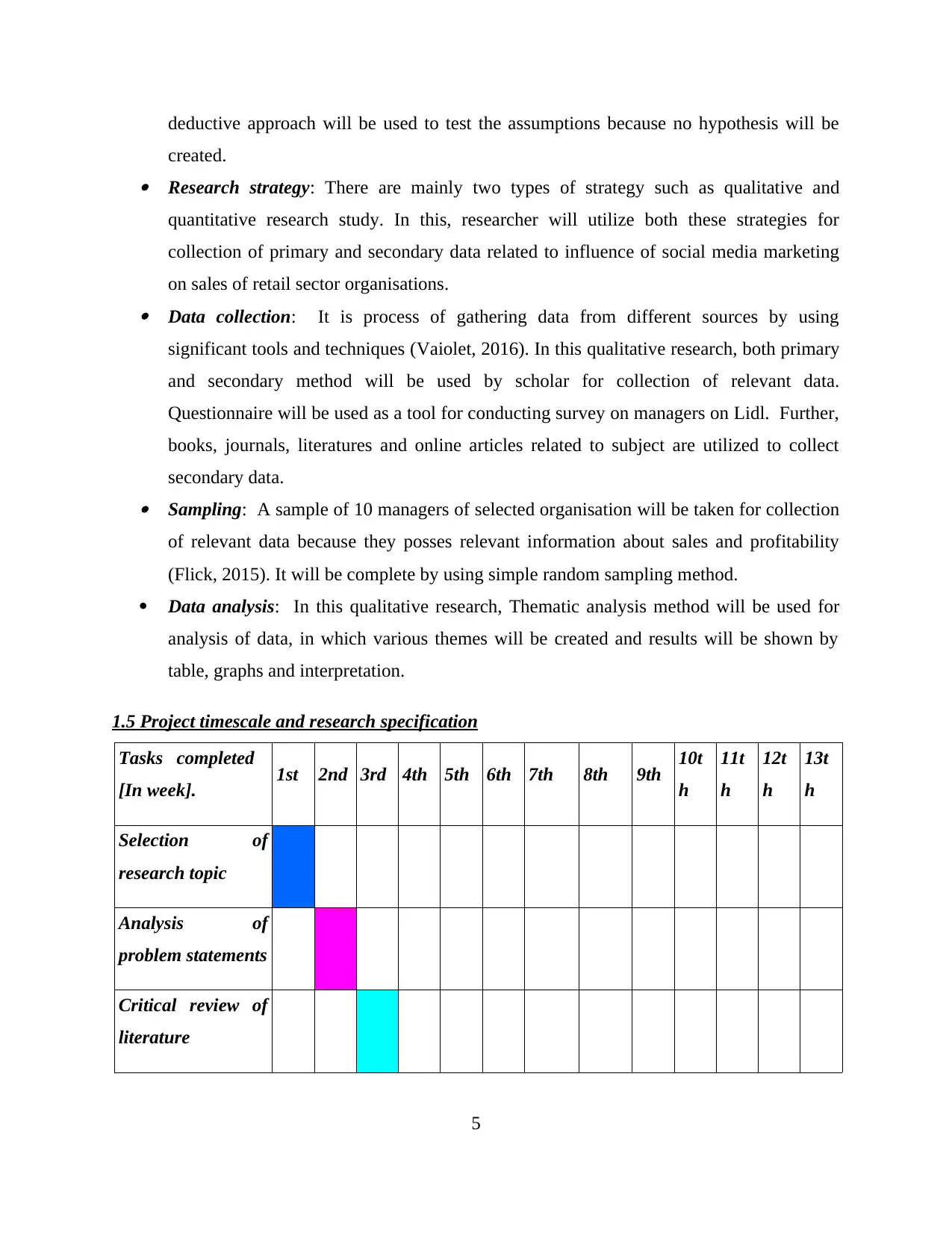
deductive approach will be used to test the assumptions because no hypothesis will be
created. Research strategy: There are mainly two types of strategy such as qualitative and
quantitative research study. In this, researcher will utilize both these strategies for
collection of primary and secondary data related to influence of social media marketing
on sales of retail sector organisations. Data collection: It is process of gathering data from different sources by using
significant tools and techniques (Vaiolet, 2016). In this qualitative research, both primary
and secondary method will be used by scholar for collection of relevant data.
Questionnaire will be used as a tool for conducting survey on managers on Lidl. Further,
books, journals, literatures and online articles related to subject are utilized to collect
secondary data. Sampling: A sample of 10 managers of selected organisation will be taken for collection
of relevant data because they posses relevant information about sales and profitability
(Flick, 2015). It will be complete by using simple random sampling method.
Data analysis: In this qualitative research, Thematic analysis method will be used for
analysis of data, in which various themes will be created and results will be shown by
table, graphs and interpretation.
1.5 Project timescale and research specification
Tasks completed
[In week]. 1st 2nd 3rd 4th 5th 6th 7th 8th 9th 10t
h
11t
h
12t
h
13t
h
Selection of
research topic
Analysis of
problem statements
Critical review of
literature
5
created. Research strategy: There are mainly two types of strategy such as qualitative and
quantitative research study. In this, researcher will utilize both these strategies for
collection of primary and secondary data related to influence of social media marketing
on sales of retail sector organisations. Data collection: It is process of gathering data from different sources by using
significant tools and techniques (Vaiolet, 2016). In this qualitative research, both primary
and secondary method will be used by scholar for collection of relevant data.
Questionnaire will be used as a tool for conducting survey on managers on Lidl. Further,
books, journals, literatures and online articles related to subject are utilized to collect
secondary data. Sampling: A sample of 10 managers of selected organisation will be taken for collection
of relevant data because they posses relevant information about sales and profitability
(Flick, 2015). It will be complete by using simple random sampling method.
Data analysis: In this qualitative research, Thematic analysis method will be used for
analysis of data, in which various themes will be created and results will be shown by
table, graphs and interpretation.
1.5 Project timescale and research specification
Tasks completed
[In week]. 1st 2nd 3rd 4th 5th 6th 7th 8th 9th 10t
h
11t
h
12t
h
13t
h
Selection of
research topic
Analysis of
problem statements
Critical review of
literature
5
Paraphrase This Document
Need a fresh take? Get an instant paraphrase of this document with our AI Paraphraser
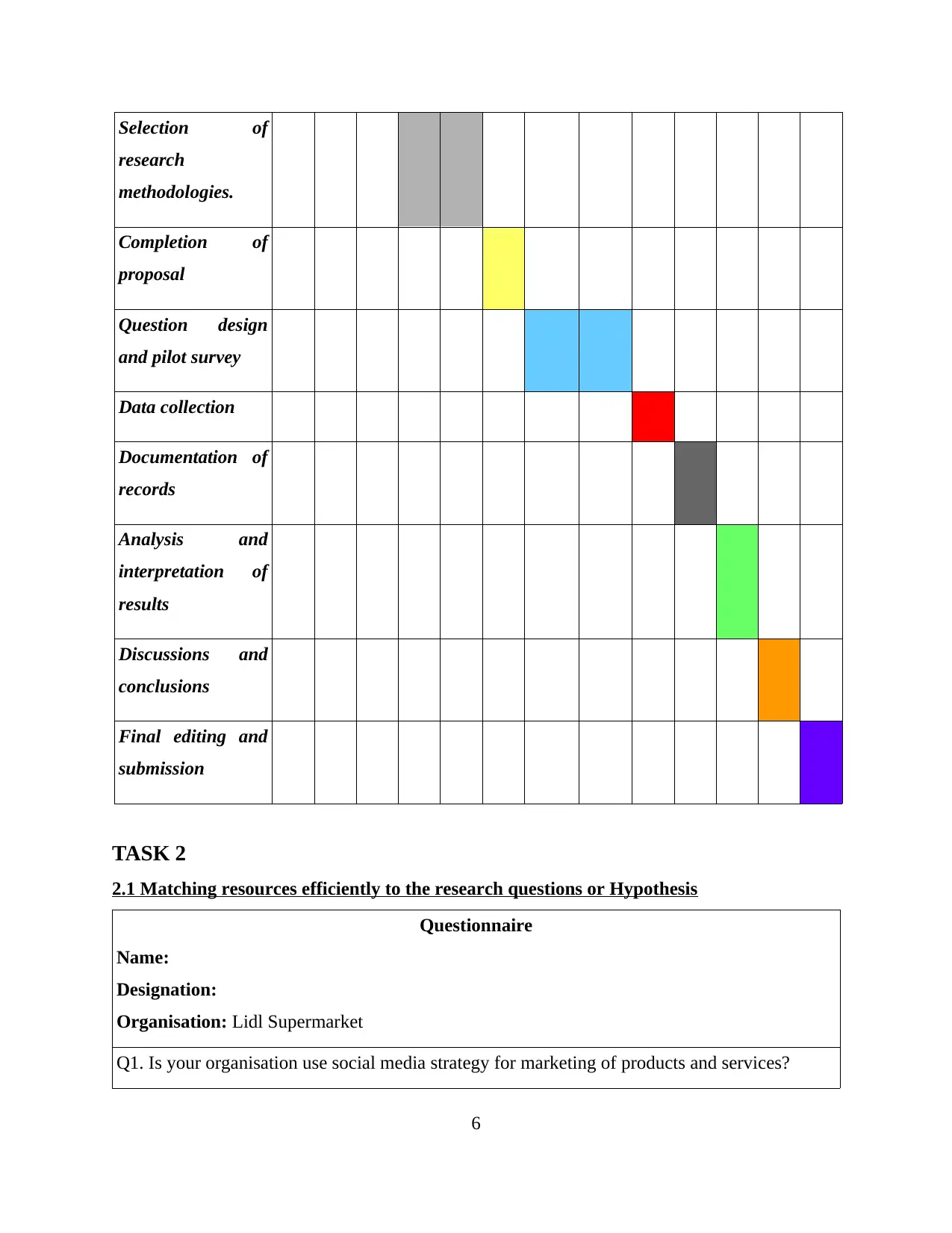
Selection of
research
methodologies.
Completion of
proposal
Question design
and pilot survey
Data collection
Documentation of
records
Analysis and
interpretation of
results
Discussions and
conclusions
Final editing and
submission
TASK 2
2.1 Matching resources efficiently to the research questions or Hypothesis
Questionnaire
Name:
Designation:
Organisation: Lidl Supermarket
Q1. Is your organisation use social media strategy for marketing of products and services?
6
research
methodologies.
Completion of
proposal
Question design
and pilot survey
Data collection
Documentation of
records
Analysis and
interpretation of
results
Discussions and
conclusions
Final editing and
submission
TASK 2
2.1 Matching resources efficiently to the research questions or Hypothesis
Questionnaire
Name:
Designation:
Organisation: Lidl Supermarket
Q1. Is your organisation use social media strategy for marketing of products and services?
6
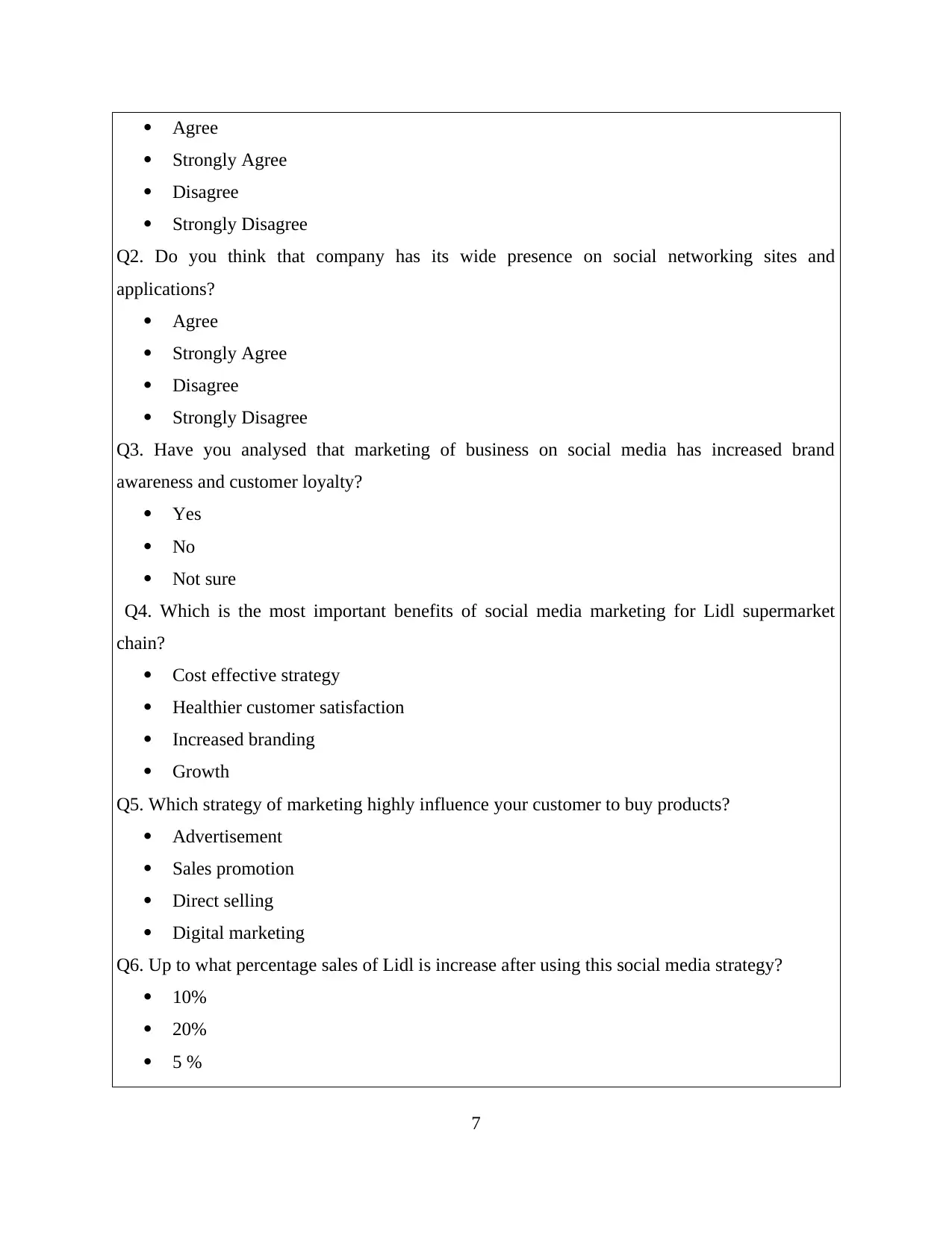
Agree
Strongly Agree
Disagree
Strongly Disagree
Q2. Do you think that company has its wide presence on social networking sites and
applications?
Agree
Strongly Agree
Disagree
Strongly Disagree
Q3. Have you analysed that marketing of business on social media has increased brand
awareness and customer loyalty?
Yes
No
Not sure
Q4. Which is the most important benefits of social media marketing for Lidl supermarket
chain?
Cost effective strategy
Healthier customer satisfaction
Increased branding
Growth
Q5. Which strategy of marketing highly influence your customer to buy products?
Advertisement
Sales promotion
Direct selling
Digital marketing
Q6. Up to what percentage sales of Lidl is increase after using this social media strategy?
10%
20%
5 %
7
Strongly Agree
Disagree
Strongly Disagree
Q2. Do you think that company has its wide presence on social networking sites and
applications?
Agree
Strongly Agree
Disagree
Strongly Disagree
Q3. Have you analysed that marketing of business on social media has increased brand
awareness and customer loyalty?
Yes
No
Not sure
Q4. Which is the most important benefits of social media marketing for Lidl supermarket
chain?
Cost effective strategy
Healthier customer satisfaction
Increased branding
Growth
Q5. Which strategy of marketing highly influence your customer to buy products?
Advertisement
Sales promotion
Direct selling
Digital marketing
Q6. Up to what percentage sales of Lidl is increase after using this social media strategy?
10%
20%
5 %
7
⊘ This is a preview!⊘
Do you want full access?
Subscribe today to unlock all pages.

Trusted by 1+ million students worldwide
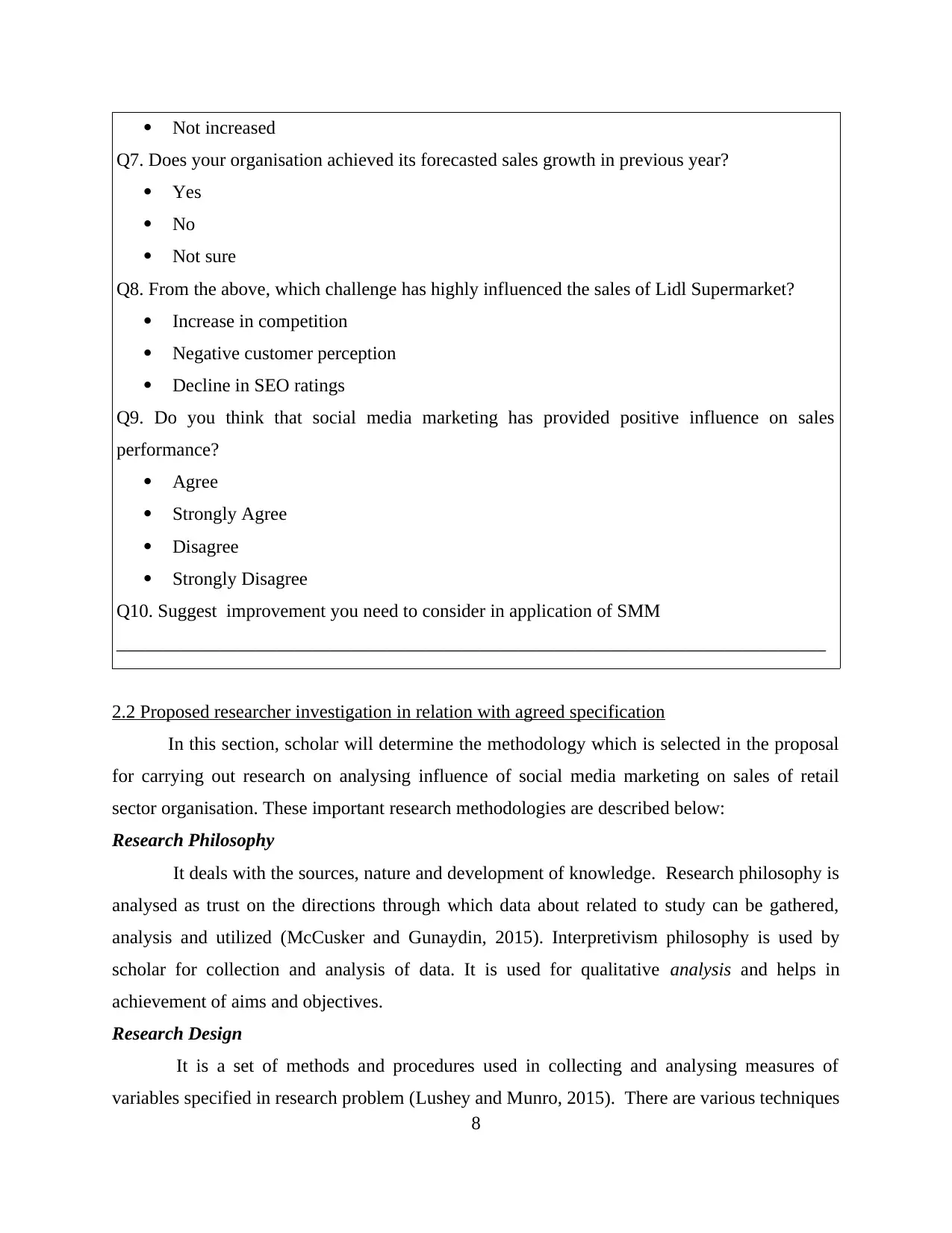
Not increased
Q7. Does your organisation achieved its forecasted sales growth in previous year?
Yes
No
Not sure
Q8. From the above, which challenge has highly influenced the sales of Lidl Supermarket?
Increase in competition
Negative customer perception
Decline in SEO ratings
Q9. Do you think that social media marketing has provided positive influence on sales
performance?
Agree
Strongly Agree
Disagree
Strongly Disagree
Q10. Suggest improvement you need to consider in application of SMM
____________________________________________________________________________
2.2 Proposed researcher investigation in relation with agreed specification
In this section, scholar will determine the methodology which is selected in the proposal
for carrying out research on analysing influence of social media marketing on sales of retail
sector organisation. These important research methodologies are described below:
Research Philosophy
It deals with the sources, nature and development of knowledge. Research philosophy is
analysed as trust on the directions through which data about related to study can be gathered,
analysis and utilized (McCusker and Gunaydin, 2015). Interpretivism philosophy is used by
scholar for collection and analysis of data. It is used for qualitative analysis and helps in
achievement of aims and objectives.
Research Design
It is a set of methods and procedures used in collecting and analysing measures of
variables specified in research problem (Lushey and Munro, 2015). There are various techniques
8
Q7. Does your organisation achieved its forecasted sales growth in previous year?
Yes
No
Not sure
Q8. From the above, which challenge has highly influenced the sales of Lidl Supermarket?
Increase in competition
Negative customer perception
Decline in SEO ratings
Q9. Do you think that social media marketing has provided positive influence on sales
performance?
Agree
Strongly Agree
Disagree
Strongly Disagree
Q10. Suggest improvement you need to consider in application of SMM
____________________________________________________________________________
2.2 Proposed researcher investigation in relation with agreed specification
In this section, scholar will determine the methodology which is selected in the proposal
for carrying out research on analysing influence of social media marketing on sales of retail
sector organisation. These important research methodologies are described below:
Research Philosophy
It deals with the sources, nature and development of knowledge. Research philosophy is
analysed as trust on the directions through which data about related to study can be gathered,
analysis and utilized (McCusker and Gunaydin, 2015). Interpretivism philosophy is used by
scholar for collection and analysis of data. It is used for qualitative analysis and helps in
achievement of aims and objectives.
Research Design
It is a set of methods and procedures used in collecting and analysing measures of
variables specified in research problem (Lushey and Munro, 2015). There are various techniques
8
Paraphrase This Document
Need a fresh take? Get an instant paraphrase of this document with our AI Paraphraser
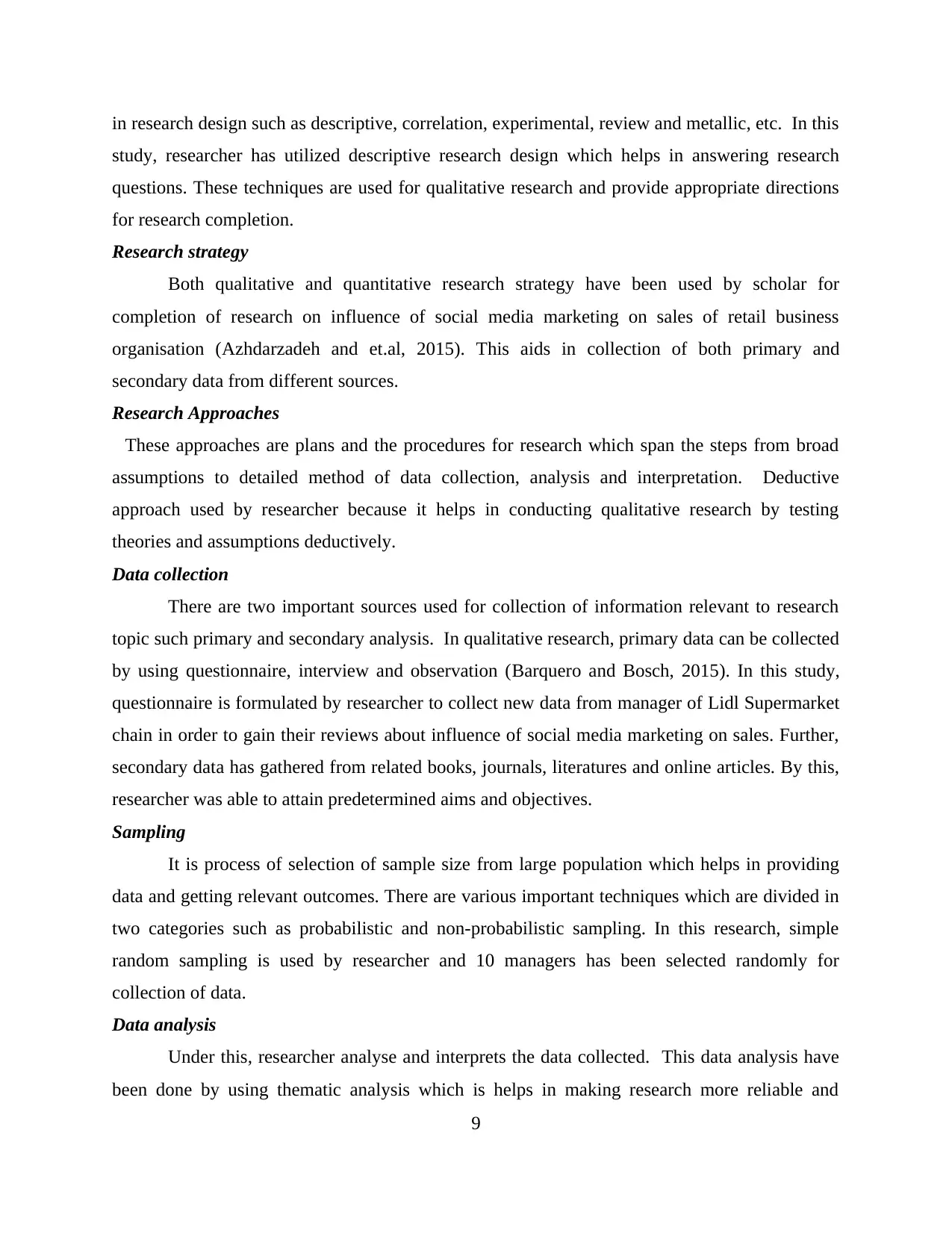
in research design such as descriptive, correlation, experimental, review and metallic, etc. In this
study, researcher has utilized descriptive research design which helps in answering research
questions. These techniques are used for qualitative research and provide appropriate directions
for research completion.
Research strategy
Both qualitative and quantitative research strategy have been used by scholar for
completion of research on influence of social media marketing on sales of retail business
organisation (Azhdarzadeh and et.al, 2015). This aids in collection of both primary and
secondary data from different sources.
Research Approaches
These approaches are plans and the procedures for research which span the steps from broad
assumptions to detailed method of data collection, analysis and interpretation. Deductive
approach used by researcher because it helps in conducting qualitative research by testing
theories and assumptions deductively.
Data collection
There are two important sources used for collection of information relevant to research
topic such primary and secondary analysis. In qualitative research, primary data can be collected
by using questionnaire, interview and observation (Barquero and Bosch, 2015). In this study,
questionnaire is formulated by researcher to collect new data from manager of Lidl Supermarket
chain in order to gain their reviews about influence of social media marketing on sales. Further,
secondary data has gathered from related books, journals, literatures and online articles. By this,
researcher was able to attain predetermined aims and objectives.
Sampling
It is process of selection of sample size from large population which helps in providing
data and getting relevant outcomes. There are various important techniques which are divided in
two categories such as probabilistic and non-probabilistic sampling. In this research, simple
random sampling is used by researcher and 10 managers has been selected randomly for
collection of data.
Data analysis
Under this, researcher analyse and interprets the data collected. This data analysis have
been done by using thematic analysis which is helps in making research more reliable and
9
study, researcher has utilized descriptive research design which helps in answering research
questions. These techniques are used for qualitative research and provide appropriate directions
for research completion.
Research strategy
Both qualitative and quantitative research strategy have been used by scholar for
completion of research on influence of social media marketing on sales of retail business
organisation (Azhdarzadeh and et.al, 2015). This aids in collection of both primary and
secondary data from different sources.
Research Approaches
These approaches are plans and the procedures for research which span the steps from broad
assumptions to detailed method of data collection, analysis and interpretation. Deductive
approach used by researcher because it helps in conducting qualitative research by testing
theories and assumptions deductively.
Data collection
There are two important sources used for collection of information relevant to research
topic such primary and secondary analysis. In qualitative research, primary data can be collected
by using questionnaire, interview and observation (Barquero and Bosch, 2015). In this study,
questionnaire is formulated by researcher to collect new data from manager of Lidl Supermarket
chain in order to gain their reviews about influence of social media marketing on sales. Further,
secondary data has gathered from related books, journals, literatures and online articles. By this,
researcher was able to attain predetermined aims and objectives.
Sampling
It is process of selection of sample size from large population which helps in providing
data and getting relevant outcomes. There are various important techniques which are divided in
two categories such as probabilistic and non-probabilistic sampling. In this research, simple
random sampling is used by researcher and 10 managers has been selected randomly for
collection of data.
Data analysis
Under this, researcher analyse and interprets the data collected. This data analysis have
been done by using thematic analysis which is helps in making research more reliable and
9
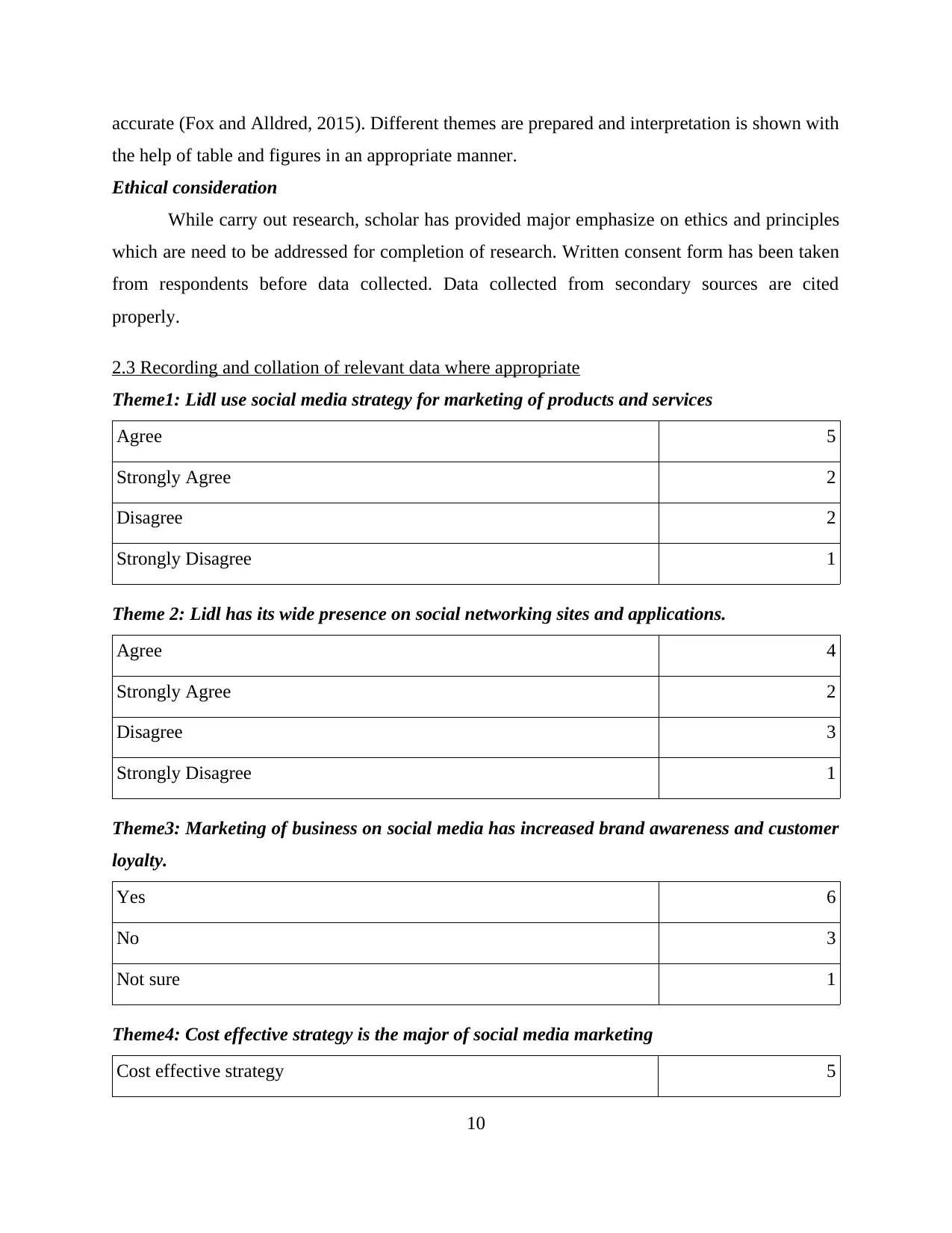
accurate (Fox and Alldred, 2015). Different themes are prepared and interpretation is shown with
the help of table and figures in an appropriate manner.
Ethical consideration
While carry out research, scholar has provided major emphasize on ethics and principles
which are need to be addressed for completion of research. Written consent form has been taken
from respondents before data collected. Data collected from secondary sources are cited
properly.
2.3 Recording and collation of relevant data where appropriate
Theme1: Lidl use social media strategy for marketing of products and services
Agree 5
Strongly Agree 2
Disagree 2
Strongly Disagree 1
Theme 2: Lidl has its wide presence on social networking sites and applications.
Agree 4
Strongly Agree 2
Disagree 3
Strongly Disagree 1
Theme3: Marketing of business on social media has increased brand awareness and customer
loyalty.
Yes 6
No 3
Not sure 1
Theme4: Cost effective strategy is the major of social media marketing
Cost effective strategy 5
10
the help of table and figures in an appropriate manner.
Ethical consideration
While carry out research, scholar has provided major emphasize on ethics and principles
which are need to be addressed for completion of research. Written consent form has been taken
from respondents before data collected. Data collected from secondary sources are cited
properly.
2.3 Recording and collation of relevant data where appropriate
Theme1: Lidl use social media strategy for marketing of products and services
Agree 5
Strongly Agree 2
Disagree 2
Strongly Disagree 1
Theme 2: Lidl has its wide presence on social networking sites and applications.
Agree 4
Strongly Agree 2
Disagree 3
Strongly Disagree 1
Theme3: Marketing of business on social media has increased brand awareness and customer
loyalty.
Yes 6
No 3
Not sure 1
Theme4: Cost effective strategy is the major of social media marketing
Cost effective strategy 5
10
⊘ This is a preview!⊘
Do you want full access?
Subscribe today to unlock all pages.

Trusted by 1+ million students worldwide
1 out of 21
Related Documents
Your All-in-One AI-Powered Toolkit for Academic Success.
+13062052269
info@desklib.com
Available 24*7 on WhatsApp / Email
![[object Object]](/_next/static/media/star-bottom.7253800d.svg)
Unlock your academic potential
Copyright © 2020–2026 A2Z Services. All Rights Reserved. Developed and managed by ZUCOL.





